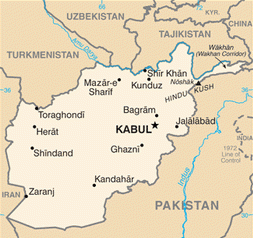With Washington’s supervision, Afghanistan is secretly adopting a system of indefinite detention for thousands of prisoners previously held without charge by the U.S., human rights organizations have found.
 As part of the Obama administration’s concessions to the government in Kabul, led by President Hamid Karzai, control of all Afghan prisons will be relinquished to Afghan control. But Washington has directed Karzai to secretly adopt what is called “administrative detention,” which means indefinite imprisonment without charge or trial for the over 3,000 detainees held in Bagram Airbase.
As part of the Obama administration’s concessions to the government in Kabul, led by President Hamid Karzai, control of all Afghan prisons will be relinquished to Afghan control. But Washington has directed Karzai to secretly adopt what is called “administrative detention,” which means indefinite imprisonment without charge or trial for the over 3,000 detainees held in Bagram Airbase.
The U.S. military’s increased use of night raids has led to a huge surge in detainees, very few of whom have had any evidence placed against them. The Obama administration has had them sent to Bagram to be held for indefinite detention without charge or trial, which Daphne Eviatar, an attorney for Human Rights First, has described as “worse than Guantanamo, because there are fewer rights.”
Now the U.S. is instructing the Afghan government to secretly adopt the very same system.
“Despite potentially far-reaching consequences, the development of this new detention power has been hidden from public view,” said Chris Rogers, a human rights lawyer for the Open Society Foundations, who has obtained a copy of the new proposal.
“When I met with leading Afghan lawyers and civil society organizations in Kabul several weeks ago,” Rogers continued, “few knew that the government was proposing to create a new, non-criminal detention regime. Their reaction was disbelief and dismay. None had even seen a copy of the proposed regime, which the Afghan government has not made public and is trying to adopt by presidential fiat.”
The news is additionally troubling for two reasons. First, night raids as a policy will continue on long past the 2014 date hailed as a withdrawal and so presumably even more detainees will be sent to Afghan-controlled prisons to be deprived of due process. And second, Afghan-controlled prisons have a history of systematic torture and physical abuse.
“Contrary to the Obama administration’s stated goals of increasing Afghan sovereignty and strengthening the rule of law in Afghanistan,” said Tina M. Foster, Executive Director of the International Justice Network, “this aspect of the transition will leave a dangerous legacy of unchecked and limitless power in the hands of whoever takes control of the country long after coalition forces have withdrawn.”
“The power to detain perceived enemies of the state indefinitely and without trial will not only lead to more arbitrary arrests and human rights abuses,” Foster added, “but will continue to fuel the insurgency for years to come – it is a great victory for the Taliban and a great loss for the Afghan people.”


